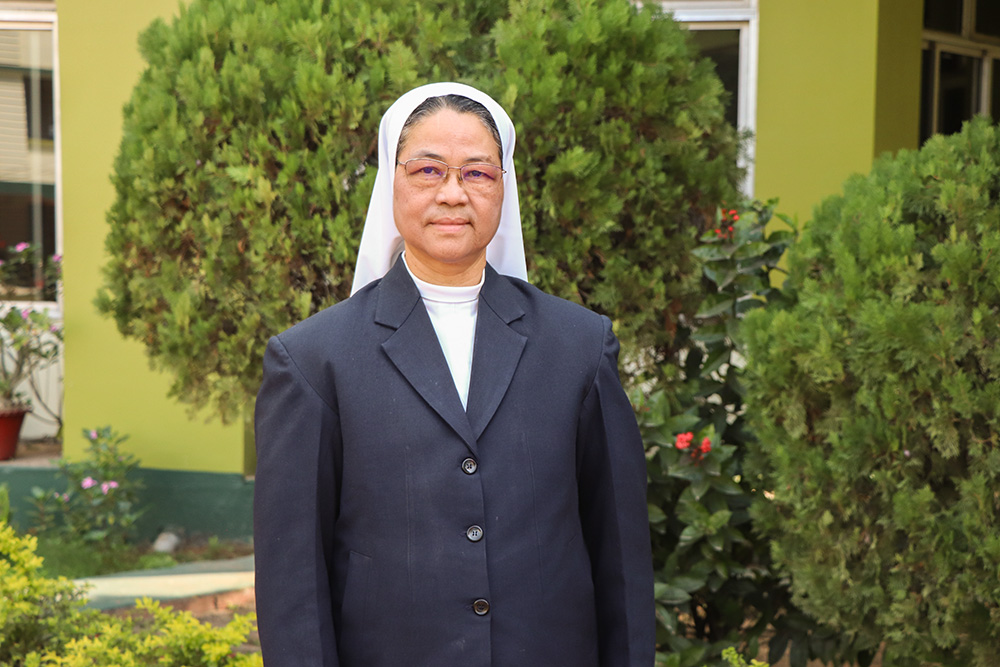
Sr. Christine Mynsong, superior general of the Missionary Sisters of Mary Help of Christians in northeastern India (Courtesy of Missionary Sisters of Mary Help of Christians)
On Jan. 27, Sr. Christine Mynsong was elected superior general of the Missionary Sisters of Mary Help of Christians, the first indigenous congregation of women in northeastern India.
Italian Salesian Bishop Stephen Ferrando founded the congregation in 1942 at Guwahati in Assam state, to recruit local women to evangelize the far-flung areas of the region, which was then fertile land for the Catholic mission.
With more than 1,500 members, it is one of the fastest-growing women's congregations in India. On Dec. 8, 2023, 52 young women from various parts of the country took their first vows. The previous day, 36 nuns professed their final vows. The congregation now has 72 women in the second year of novitiate and 66 in the first.
Mynsong, a native of Meghalaya, another state in the region, has served the congregation in village missions, formation, education and as provincial and general councillor.
The nun in her 60s spoke with Global Sisters Report about why her 82-year-old congregation continues to attract vocations when many others struggle to get new members.
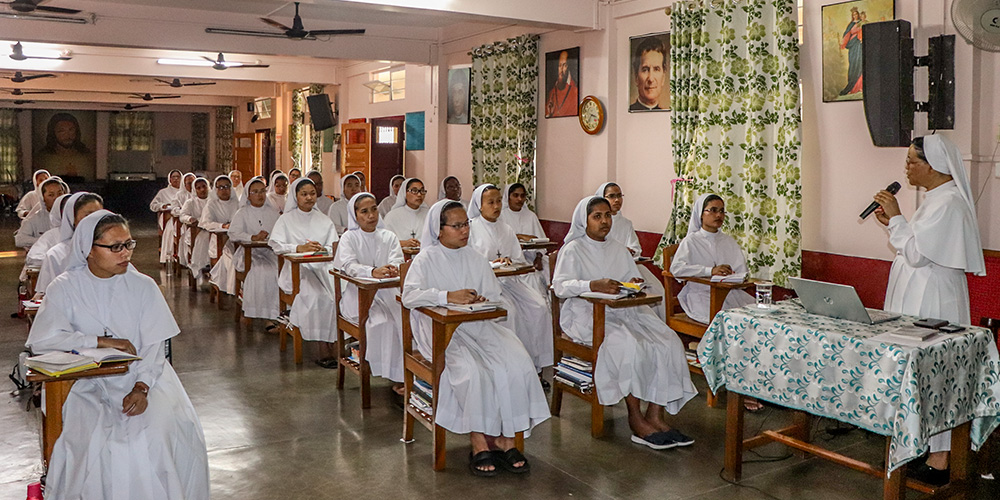
Sr. Christine Mynsong speaks to sisters at Hatigaon, Guwahati, India. (Courtesy of Missionary Sisters of Mary Help of Christians)
_____
GSR: Why are your congregations attracting so many vocations? What is the secret?
Mynsong: The primary factor that attracts young girls to our congregation is our charism, which is evangelization and catechesis. The methods we use are village tours and family visits that help us enter people's lives. By being with them, staying in their families, sharing the same house, eating the same food, we come to know the family and the members closely.
During the visit, we listen to them sharing joys and sorrows, problems and difficulties. We counsel, guide and pray with them [and] in most cases [that] helps resolve their problems and brokenness. During the visits, we propose that young girls join us.
Apart from this, our community is empowered to identify girls with a disposition for religious life. It is encouraged to identify at least two girls every year. One secret could be our way of life in villages, our being one with the people and the way we live our charism.
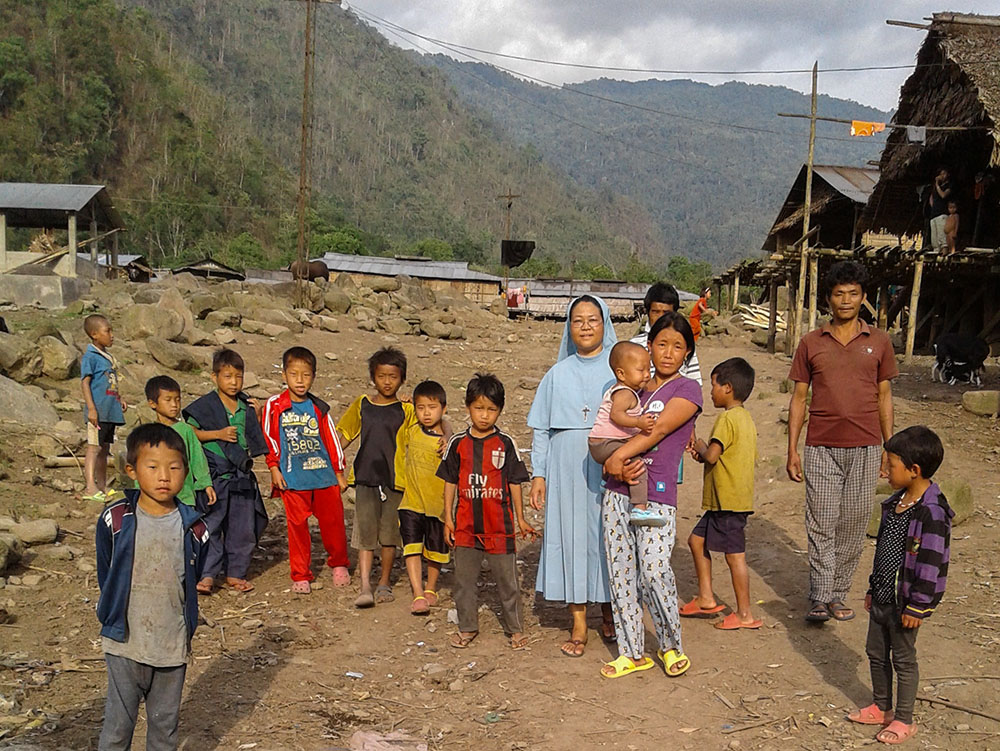
Sr. Christine Mynsong with a group of children during a visit to Tato, Shi Yomi District, Itanagar, Arunachal Pradesh, India (Courtesy of Missionary Sisters of Mary Help of Christians)
What are the challenges and opportunities your congregation has in northeastern India?
People in Northeastern India face challenges such as insurgency, ethnic and political conflicts, economic disparities and environmental issues. There is also a growing tension and many conflicts between various ethnic groups.
Illiteracy is a big problem in many parts of our region. Villagers in far-flung areas do not have the convenience or finances to educate their children. Many drop out and work on farms or rear cattle.
Unemployment is another huge problem. Many young people are forced to go to other parts of India for jobs.
[The] easy availability of drugs has been destroying young lives in the region.
You have members from various ethnic groups. How do you train them to get over their differences and work as members of the same congregation? Are there any specific programs in the formation?
From the initial stages of formation, the trainees are helped to love and appreciate one another's culture. We organize annual cultural weeks where each tribe/group shares their culture, stories, food habits and other things. In cultural exhibitions, the trainees learn from each other.
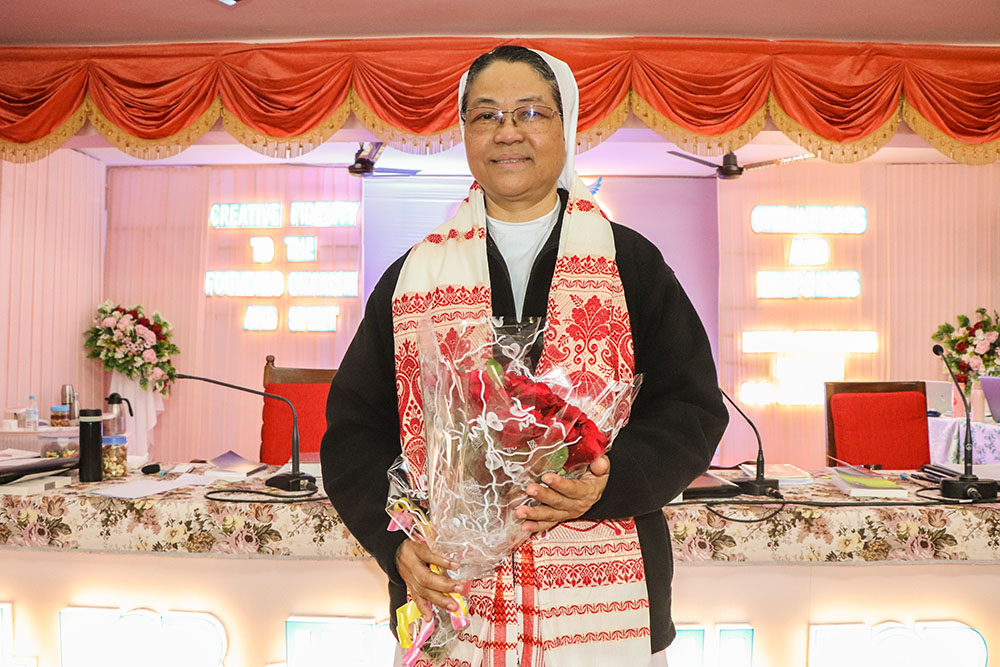
Sr. Christine Mynsong, newly elected superior general of the Missionary Sisters of Mary Help of Christians in northeastern India, is congratulated with a local Assamese shawl. (Courtesy of Missionary Sisters of Mary Help of Christians)
They are taught in various languages, prayers, songs, dances, music [and] cultural programs. The members grow up learning to enjoy the others' [cuisine], spirituality, language, art forms and lifestyles.
Being a congregation born in Northeast India, living with various ethnic groups is not a problem. In fact, we enjoy living with people of different cultural backgrounds. We organize cultural seminars [and] workshops in the various formation stages to help us know one another's culture and appreciate, value and treasure them as our common heritage.
How has the yearlong ethnic violence in Manipur affected your congregation?
We have 15 convents in Manipur, and about 65 sisters working in the state. We have members from both the clashing ethnic groups, Meitei and Kuki-Zo. While some sisters left the place immediately, closing centers, some took the risk of staying back to protect the church property.
Our sisters have been involved in several charitable initiatives during the violence. They are into relief work. They have distributed food, clothes [and] medicines to the displaced.
Advertisement
Our sisters have visited both ethnic groups in conflict in the hope of promoting peace. They have prayed with the people for peace.
We have accommodated students of different groups. Our many schools and boarding houses take care of food, lodging and education of children.
Our sole aim has been to make persons and communities feel the never-failing mercy and love of God.
What is your vision for your congregation? When did your congregation go beyond village ministry to launch other apostolates?
At the initial stage, the village ministry was the immediate option to carry out this charismatic task. Eventually, when other opportunities came, we broadened our outreach without losing our primary vision.
We want our members deeply rooted in the experience of Christ. All our apostolic undertakings are geared toward achieving this vision. We reach out through institutions to educate women, girls and children [and] care for orphans, widows, [the] aged, sick, lepers and refugees.
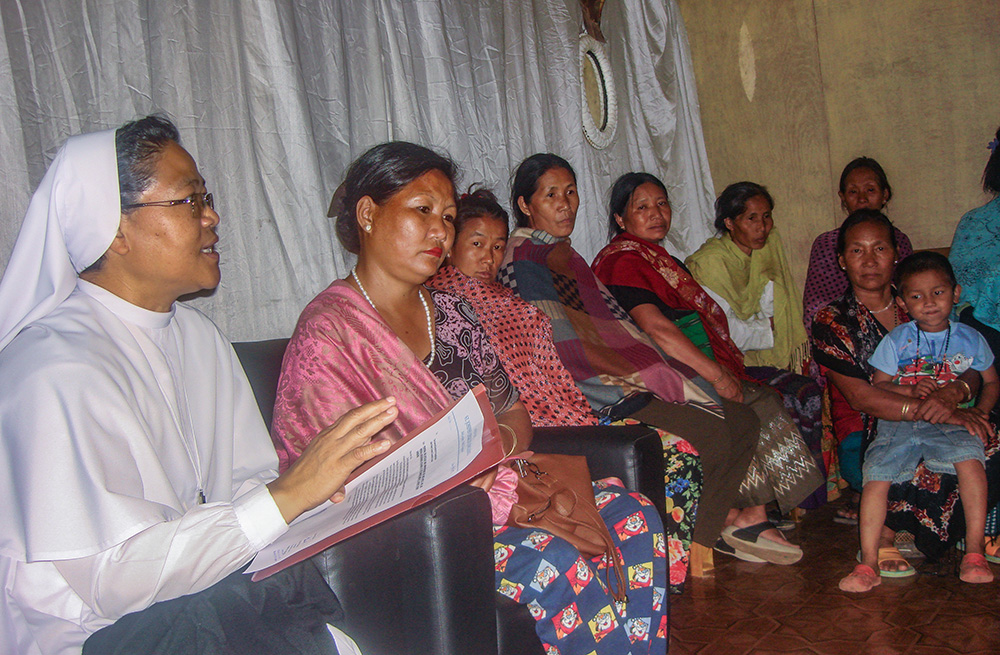
Sr. Christine Mynsong speaks to a group of women at Tato, Shi Yomi District, Itanagar, Arunachal Pradesh, India. (Courtesy of Missionary Sisters of Mary Help of Christians)
What are your various ministries for helping people in different situations?
We collaborate with dioceses and parishes in pastoral ministry. From the beginning, we managed dispensaries in villages.
We have worked to promote the rights of domestic workers in different cities in Northeastern India. Those migrating to towns for jobs are at times vulnerable to physical and sexual abuse, besides long working hours and deprivation. We are concerned about their security. We attend to domestic workers' children.
We work for persons with disabilities. We work to prevent human trafficking and unsafe migration, especially in many villages of Assam tea estates. We also conduct surveys and awareness programs and health care that cover thousands of households.
Tell us something about your vocation and family. Why did you become a nun?
I come from a middle-class family; my father was a catechist in the parish.
During my high school days, I stayed in a boarding house managed by our congregation. Besides academics, I was taught the word of God, faith, prayers and many other skills. The sisters organized monthly programs to help us develop our talents.
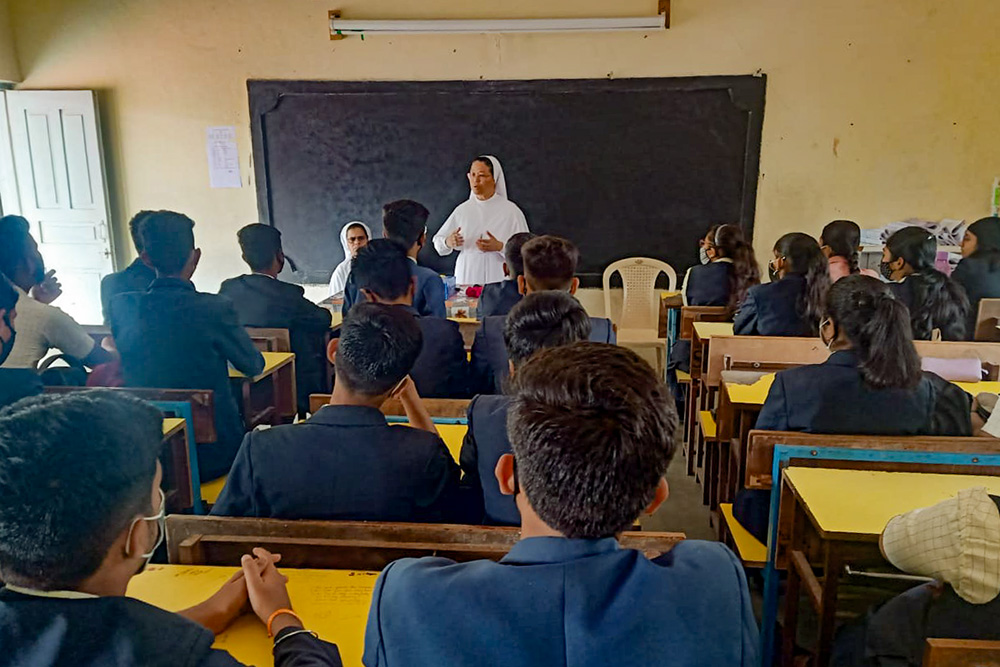
Sr. Christine Mynsong speaks to a group of students at Pusad, Yavatmal District, Maharashtra, India. (Courtesy of Missionary Sisters of Mary Help of Christians)
Those programs made me brave. I could sing, speak well and lead others. At the same time, I was touched by the sisters' village visits when they taught people about faith and life. I, too, went with them, did the sacristan's work, read in the church and sang in the choir. The sisters' joyful life motivated me to join them.
What are the challenges you faced in your religious life?
I didn't have any extraordinary challenges but those that everyone faces in a religious life. There have been personal challenges, such as the battle between the flesh and the spirit, the desire to grow in holiness, and at the same time, recognizing my human weaknesses and facing my human fragility. There are also challenges in community life since each one is different.
Do you have any suggestions or advice for congregations that have few vocations?
In a world of materialism, our witnessing life is the most important gift to the younger generations. Meeting people in their families and accompanying persons in their lives is a source of getting vocations.
Creating a communion among the congregations working in a geographical area and networking can inspire new vocations.





